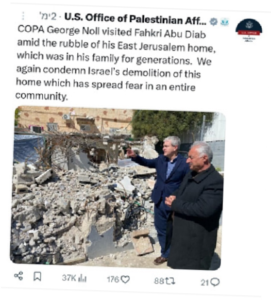
Ramadan in Jerusalem
1. The month of Ramadan began officially on Monday night in Israel [though see below], in accordance with the ruling of the Supreme
Court in Saudi Arabia. The Mufti of Jerusalem decided to follow the Saudi ruling this year, and the Palestinian Authority followed suit.\
2. Islamist Jordanian Parliament Members are pressuring the Waqf in Jerusalem – controlled by Jordan – to allow the performance of the Itikaf custom throughout the entire month of Ramadan. Itikaf is the practice of remaining overnight in a mosque, particularly on the Temple Mount. The Waqf, at this point, is still standing strong in restricting the Itikaf only to the last ten nights of Ramadan – as has been the case over the past few years in accordance, with an agreement made with the Israeli authorities.
3. There is concern in Jordan regarding how the war in the Gaza Strip might develop. Of particular disquiet is the Egyptian-Gaza border city of Rafah, where Israel has said it will soon launch a major offensive in order to deal a final and game- changing blow to Hamas. An escalation in the fighting in Rafah could increase the pressure on Jordan to respond to the extremists’ demands. The Waqf actually does not want to go that way, but fears it may have no choice.
It cannot be ruled out that such reports are meant to signal Israel that it should “moderate” its offensives in the coming weeks, and not attack Rafah at all, in order to avoid an escalation by Arab Muslim extremists on the Temple Mount.
4. The Israeli government has decided to keep Public Security Minister Itamar Ben-Gvir out of the loop regarding the Temple Mount prayer restrictions during Ramadan – and Jordan is pleased. Ben-Gvir favors a stronger hand towards the Arabs who come to pray on the Mount during Ramadan, but the government has overruled him.
5. Jordan and Israel have agreed that the first week of Ramadan will be a trial run – a test by which to judge what restrictions to enforce on worshipers at the Mount in the coming weeks.
Behind the scenes, Israel and Jordan are in regular contact in order to control the events on and around the Mount. In other years, the contacts were above-board.
According to a report on the Al- Quds Al-Bawsala website, despite the Waqf’s decision to accept the Saudi ruling regarding the first day of Ramadan, many in Jerusalem did not accept it.
Instead they began observing Ramadan customs a day earlier, on Sunday night. A special prayer service was held on Sunday night outside the Temple Mount, the closest point that the worshipers were able to reach.
The worshipers outside the mosques.
George Noll, Chief of the U.S. Office of Palestinian Affairs (OPA) – the de- facto US embassy in the Palestinian
Authority-controlled areas – visited the razed home of Fahri Abu-Diab.
The building was razed by Israeli authorities because it was built illegally. OPA calls Abu-Diab a “communal leader.”
In fact, however, Abu-Diab has ties with the Turkish “Miratana” association, which functions under the auspices of KUTAD, headed by Hamas senior Jihad Yamour. Among the kidnappers of IDF sol
Nachshon Wachs in 1994, Yamour live Turkey, from where directs Hamas activit in Jerusalem.

Noll’s visit as seen
on OPA’s X account
Noll also met wi for [terrorist] prisoners, and the two discussed matters concerning the terrorists held in Israeli jails.
Many of these prisoners are of the Nukhba gang, which carried out the Oct. 7th massacre
This was not the end of the extensive activity of the U.S. State Department in Israel this week, all carried out independently and distinctly from the real United States Embassy in Jerusalem:
The administrator of USAID, Samantha Power, as part of a visit esigned to enable increased aid to Gazan Arabs, also visited an illegal art center in the Ramallah area. She condemned the building’s demolition “at the hands of settlers.”
In truth, the story is apparently just a land dispute near Kafr Niama (just east of Bil’in, between Dolev and Modiin Illit) – and yet Ms. Power is taking an unequivocally anti-Israel stand on the issue on behalf of the United States.
Social Media
→ This past Friday, the last prayers were held before the onset of Ramadan, and according to reports on the 0202 Viewpoints from Jerusalem site, the entry restrictions to the Temple Mount were stricter than the weeks before. Hundreds of worshipers, according to the site, spread prayer mats on streets around the Old City and prayed there.
It is possible that this was a preparation for the stated intentions of many Israeli- Arabs to hold Ramadan prayers in the same manner. They also may be planning to do so in public places such as the Mamilla and Ben-Yehuda open-air malls, in the event that the restrictions continue during Ramadan.
Trending
Both Jordan and the Islamic Waqf in Jerusalem are well aware of the Islamist provocations that will be made during Ramadan to incite unrest, especially on the Temple Mount and the mosques there. They expect there will be violent disturbances and terrorist attacks, encouraged by Hamas and other Islamic elements identified with Hamas. The most blatant and easy provocation will be an attempt to carry out the Itikaf custom very early in Ramadan, in opposition to the Waqf decision. This is liable to cause disturbances, which the Islamists hope will develop into violence.
Though this is their direction every year, this year it is even stronger on the backdrop on the war in Gaza. Israel and Jordan are engaged in intensive dialogue to prevent the extremist Muslims in both Jerusalem and Jordan from gaining the upper hand.








